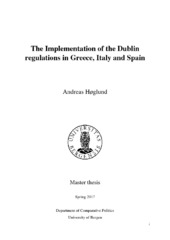| dc.description.abstract | The objective of this thesis is to explain variations in the implementation of the Dublin regulations in Spain, Italy and Greece. My theoretical framework draws from the literature on Europeanization. I have conducted qualitative document analysis and semi-structured interviews with experts in Brussels as well as in countries concerned. The analysis shows how the main variable to explain implementation of Dublin is state capacity, in other words how well the functioning of the national administrations are. Spain, where the state capacity is better than in the two other case countries, is where the implementation has been most successful. Another important variable is the number of asylum seekers. Spain receives the lowest number of asylum seekers compared to Italy and Greece. Italy is the member state with the highest number of arriving asylum seekers. While Greece receives fewer than Spain, it is still large when considering the country’s population and GDP. The number of asylum seekers has become an even bigger concern in the light of the 2015 “influx” of migrants. Misfit and veto players, two central variables in the Europeanization theory, are not able to explain the variation in implementation between Spain, Italy and Greece. When the Dublin convention was introduced, there was no substantial difference on misfit between the three countries. Making misfit obsolete when explaining variation in implementation. Moreover, I found no evidence of veto players hindering implementation in any of the case countries. The lack of opposition from veto players may be explained with the nature of the Dublin regulations. The legislations directly concerns the national government and asylum seekers. It does not directly affect regional administrations, business interests or organised labour, which typically play the role of veto players. The Europeanization theory, although able to explain a variety of policy fields, is not able to explain variation in the implementation of the Dublin regulations. The “Worlds of compliance” typology suggested by Falkner et al, created to understand implementation traditions, does not fit the empirical evidence either. Instead, this thesis shows that state capacity in combination with the number of arriving asylum seekers are the best indicators to explain Spain’s success and the difficulties in Italy and Greece with the implementation of the Dublin regulations. | en_US |
